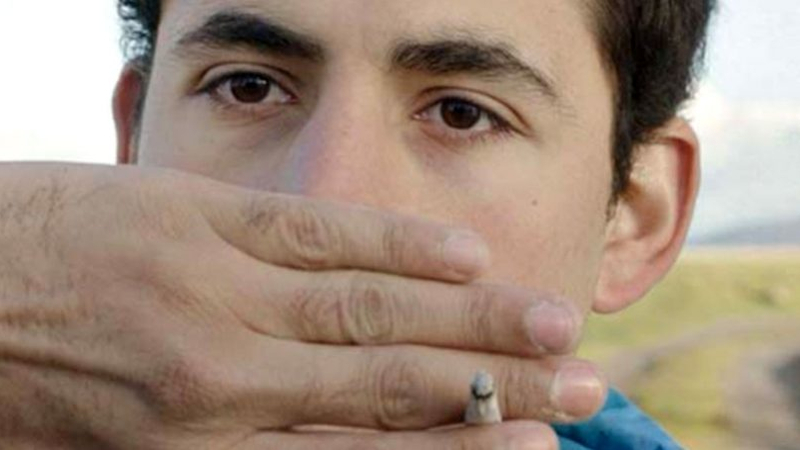Director – Ben Sharrock – 2020 – UK – Cert. N/C 15+ – 103m
****1/2
Immigrants are holed up in a rundown house on a bleak Scottish island as they await letters granting their requests for asylum in the UK – on MUBI from Thursday, September 23rd
A smiley chalked on a blackboard. A woman’s austere face suggesting exactly the opposite. Instructors Helga (Sidse Babett Knudsen) and Boris (Kenneth Collard) are demonstrating how a man should behave towards a woman dancing to pop music. Helga’s top looks far too proper and her skirt both far too formal and long for a good night out, as if she were dressed for work in an office. Boris is admonished for first resting his head on Helga’s clothed breast then putting his hands on her bottom. “Now, can anyone tell me what Boris did wrong,” she asks the group of stunned men watching, seated.
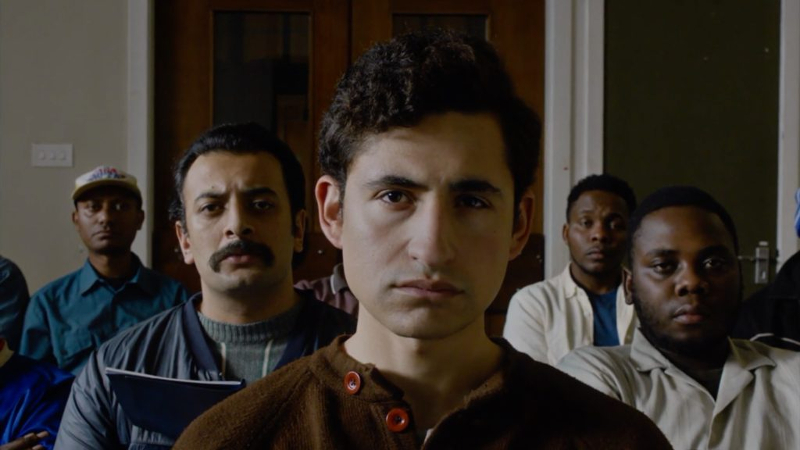
Behind her on the blackboard are the words, “Cultural Awareness 101. Sex. Is a smile an invitation?”
Welcome (or maybe not) to the world of an asylum seeker from Syria placed on a remote Scots island. Welcome (or maybe not) to the UK’s Hostile Environment.
A rudimentary training centre. An inhospitable landscape. A rundown house in which to stay.
A phone box under a street lamp in the middle of nowhere, the only place of contact with the outside world.
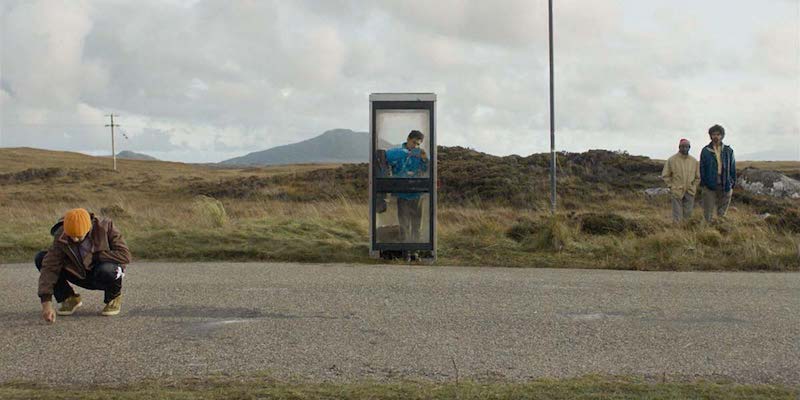
There’s nothing to do here and Omar (Amir El-Masry), arrived from Syria, carries his Oud in a case with him everywhere but can’t bring himself to take it out and practice. All he and fellow asylum seekers / housemates Farhad (Vikash Bhai), Wasef (Ola Orebiyi) and Abedi (Kawbena Ansah) can do is watch pirated DVDs of Friends (series, created by David Crane, Marta Kauffman, 1994-2004) on the TV.
From the opening dancing lesson, a sketch in uncool which makes you wonder what on Earth the authorities and those in their employ are thinking, writer-director Sharrock eschews the usual rules of narrative dénouement to instead place a series of unsettling images in front of the viewer. Putting a group of asylum seekers in the middle of beautiful but bleak Scottish landscapes makes them feel completely out of place, as indeed they are: stateless and awaiting letters that will, they hope, tell each of them they can stay in Britain. Or perhaps that’s a false hope, set up simply to be dashed.
The training centre, adorned by a shabby sign that verbally says “Refugees Welcome” but non-verbally conveys exactly the opposite, hosts classes that no-one actually wants to either hold or attend. As one of the asylum seekers observes, “this is an attempt to break us.”
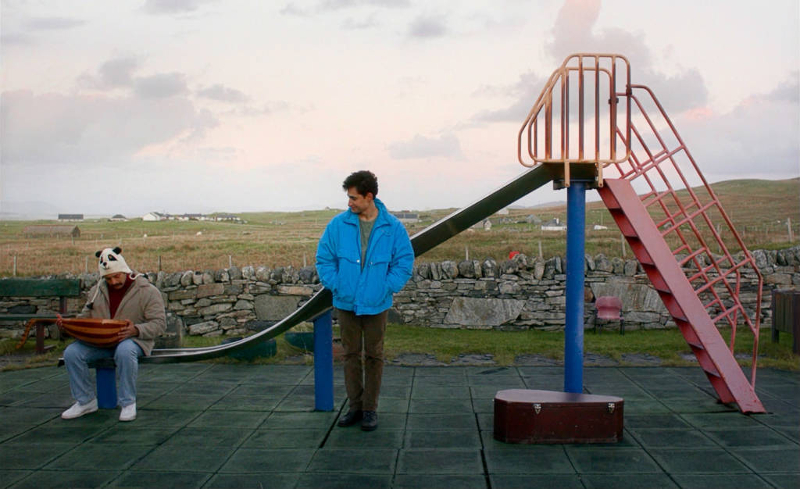
The locals address them as “pal,” before, in the case of a car carrying two local lads and two lasses, asking Omar if he’s a “Paki” – a concept they then struggle to explain to him, bombarding him with a slew of opinions about how all immigrants are al-Qaeda terrorists intent on blowing things up and raping women. They then generously proceed to give Omar a lift into town, as if to say, “oh, we don’t mean YOU”. Elsewhere, a woman in a dolphin costume complete with dolphin head offers an invitation to meet local celebrity Derek The Dolphin.
The refugees observe of the local fishpacking plant where you can get work paid cash-in-hand and watch a police van turn up. The vehicle seems to redefine the landscape as it speeds across it. A red Royal Mail van blaring opera from the dashboard sound system does much the same thing earlier, confounding us as the driver stops and starts every ten yards to deliver to semi-circular cluster of houses, watched by asylum seekers wondering whether any of their all important letters will be among today’s deliveries.
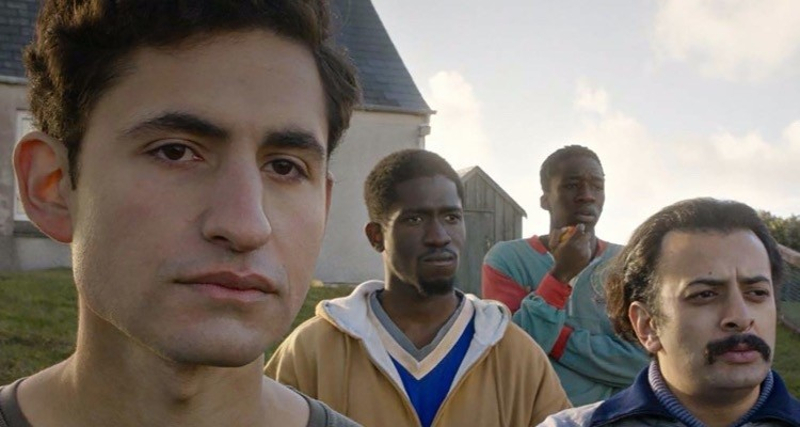
The house that the four asylum seekers share is rundown and shabby with the police turn up at the door any time to deport some or all of them. There aren’t enough chairs and at one point, Farhad turns up with a stolen chicken which at least means he can eat eggs regularly. There’s a stark electric bar fire. Omar has one conversation with Farhad where a door of patterned glass comes between them, its opacity reducing Farhad, viewed through it by Omar, to a fractured, out of focus equivalent of a human being.
When Omar visits the local shop and innocently addresses the indigenous Scots-accented Indian operating the checkout as a “Paki”, his attention is directed to a list of racist words and phrases not to be uttered on the premises, including “camel jockey”.
In the closing minutes, Omar has an (imagined) meeting with his brother Nabil (Kais Nashif) who stayed behind in Syria. It takes place in the middle of a snow-covered winter landscape in an empty house. The stone interior may be bleak, but it’s homely in a way that the centre and the allocated house never could be: it speaks of a couple of hundred years of tradition and a place where one might actually want to be. A place other than, as the title puts it, limbo.
In short, this slow and sedately paced film charges headlong at Britain’s racist underpinnings and points an astute finger at the asylum processing system as a means of dehumanising those it processes. In the year of Brexit’s commencement, it could hardly be more timely.
Limbo is on MUBI from Thursday, September 23rd.
Trailer:
Official Clip #1
UK Cinema Release
2021
Friday, July 30th
Festivals
2021
Glasgow (Wednesday, March 3rd to Saturday, March 6th)
2020
London
